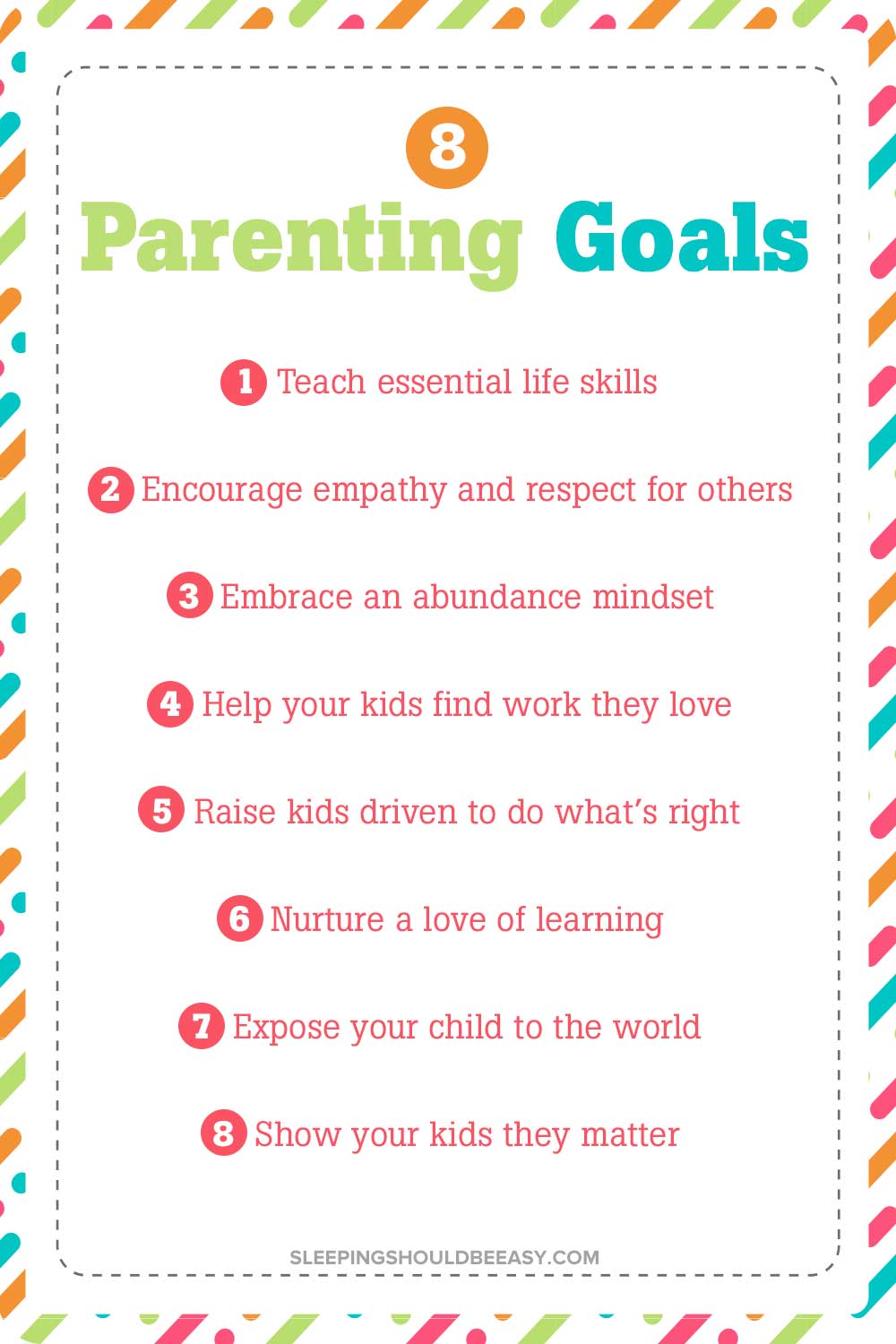8 Parenting Goals Every Mom Should Have
Having long term parenting goals is a must for any parent. Discover 8 examples of goals for kids to be able to do throughout childhood and beyond.
 My husband saw me in the hallway with tears in my eyes. “What’s wrong?” he asked in alarm.
My husband saw me in the hallway with tears in my eyes. “What’s wrong?” he asked in alarm.
“I’m sad that they’re going to kindergarten,” I sobbed back.
Emotional, I know. But as my twins wound down their last few weeks at preschool, I was reminded of how quickly childhood flashes by. As much as we wish for certain stages to end already (ahem: tantrums), once you hit a milestone, you realize there’s no going back.
It’s moments like these that make you take stock of how far the kids have grown, and how much you’ve contributed to their growth.
Because if there’s one job we have, it’s to raise future adults. And ideally, future adults who can expand and make the world a better place in the unique way only they can.
Table of Contents
Best parenting goals to aim for
At the end of the day, our kids are who they are. But much of their “programming” is directly affected by how we raise them, from the words we use to the family values we live by.
If I were to imagine sitting in front of my grown kids, I’d love for them to adopt the values that will serve them and others well. It’s not so much about which careers they choose or where they’ll live or how they’ll look, but simply… a way of being.
Take a look at these examples of parenting goals, and what I would love for my younger kids to grow into. As one parent said:

I also share ways that I’m teaching and applying these parenting goals and objectives, and how you can, too:
1. Teach essential life skills
I know I’m not the only parent who has tied her child’s shoelaces—even if she can do it herself—just to cut down on time.
As much as we’re tempted to, though, we need to allow our young kids to do things for themselves. From tying shoelaces to managing their own homework and even to knowing how to talk to people, these skills pave the way for adulthood.
Your young child is ages away from adulthood, but these formative years make for the best “practice” ground. Encourage her to do things for herself and learn critical skills she’ll likely need as she grows up.
There’s always a learning opportunity to be made through mistakes. So, even if she makes them—which she will—at least the stakes are lower now than they can be when she’s an adult.
Take a look at the 8 life skills your child will likely need in adulthood.

Free email challenge: Looking for actionable steps and quick wins in parenting? Join my newsletter and sign up for the Better Parenting 5-Day Challenge! This is for those who want good parenting skills but need that nudge and supportive guidance.
Over the course of 5 days, we’ll tackle one actionable tip per day you can do right away that can transform the way you raise your child. This is your chance to challenge yourself and make the positive change you’ve been meaning to make. As one parent said:
“I’m loving this challenge so far. Thanks so much for the helpful info. It really worked and the day went smooth!” -Destiny Wilson
2. Encourage empathy and respect for others
We’re all connected. Rather than teaching kids to be wary, disrespectful, or even oblivious to others, they can learn social skills like empathy and mutual respect.
This means imagining what it must be like to be in other people’s shoes, or to be able to disagree without putting other people down. To remember that, deep within, we all have a heart, regardless of where life has taken us thus far.
And that, in the long run, friendship isn’t measured by the number of people you know, but by the quality and connection we have with others.
3. Embrace an abundance mindset
I want my kids to know that abundance is always available for them, and that they shouldn’t work from a lack or scarcity mindset.
Instead of focusing on what we don’t have, we can be grateful for the abundance we do have, in both big and small ways. I steer clear of saying things like, “We can’t afford that,” and instead say, “I didn’t plan to buy that today.”
And once in a while, I give them treats, from a surprise bowl of ice cream to a day trip to the zoo.
This doesn’t mean you spoil your kids, focus on material items, or spend beyond your means. But it does mean planting the idea that there is plenty to go around, and eliminating limiting beliefs about what they can or can’t do.
The best way to nurture this mindset is to practice generosity. Think of prosperity as water: abundance isn’t about storing water in a jug and trying to make it last. Instead, abundance is like a river, where you can give as freely, knowing more is on its way.
4. Help your kids discover what they love
I used to believe that work was simply a means to an end, something you do so you have the resources to do what you actually want to do.
Now I know this doesn’t have to be the case—you truly can make a living doing something you enjoy. I’m fortunate that my husband and I can lead by example so that our kids can do the same for themselves when they’re adults.
Even if you don’t feel called to do your work, then share with your child how grateful you are to be able to work at all. Begrudging work only paints a negative picture on what to expect when she becomes contributing member of society.
Turn it around and encourage her to pursue her interests and passions, no matter how unlikely or financially-limiting they may be. Nurturing that desire can open more opportunities she never thought possible, instead of assuming the purpose of work is only to get paid.
In the big picture, you want to have the kind of relationship where she knows you have her back, no matter what.
5. Raise kids driven to do what’s right
Too often, we praise kids for following the rules, that we overlook the importance of doing what’s right—even if that means going against the rules.
Maybe that means your child hangs back after recess ends to comfort a friend who’s upset, even though that would make her late. Perhaps instead of telling on her brother for drawing on the table, she helps him erase it, knowing he’s had a rough day.
It takes courage to do what’s right, especially in difficult situations.
Rules exist to guide your child to make the right choices in her daily life, but there are special times when the right thing to do can’t be defined within those rules. Instead, encourage critical thinking skills that allow her to consider her options before making a decision.
6. Nurture a love of learning
Does your child ever say:
“I wonder…”
“Why…?”
“Maybe…”
Perhaps you’ve found him reading for a long time, drawing picture after picture, or exploring in the backyard. This curiosity is his natural love of learning in full force. Nurture these healthy habits, especially in childhood, when it comes so easily and unhindered. You can:
- Embrace his interests, no matter how different or quirky they may be
- Provide plenty of downtime in your schedule
- Highlight the satisfaction of learning
- Focus on the process or the journey, not the end
- Embrace risk-taking and challenges
- Foster resilience by not giving up too easily
7. Expose your child to the world
Whether you live in a small town or a bustling city, it’s easy to remain only in that world. And for kids, this is even more alarming considering how limited their version of the world may be.
That’s why a long-term goal of mine is to expose my kids to the world. If I had it my way, I’d take them traveling all over the globe. But for now, I expose them to a wide variety of cultures, people, and environments through other ways, like:
- Eating different food from other cultures
- Reading books about children from other parts of the world
- Attending cultural and musical festivals
- Taking them to museums and galleries
- Traveling in whatever ways we can
With a wider view of the world, kids learn to be more understanding, empathetic, and welcoming of others.
Read these multicultural children’s picture books.

8. Show your kids they matter
At the end of the day, we all want to know we matter, including our kids. And as parents, we need to show that we love them unconditionally. They don’t have to do a single thing to deserve our love. Even through their misbehavior, we still love them no matter what.
Showing them they matter also means letting them know they’re special. That they have a unique contribution to this world that only they can do, and that no one else can ever replace them. Let them know what you especially love about them, and the difference they make in other people’s lives.
This really can work! In fact, check out the a-ha moment that reader @4thisiprayed described on Instagram from applying this concept:
“Sometimes it gets challenging being a parent (currently ushering in a threenager), but I’m trying to find ways to parent more effectively so I bought some material by @sleepingshouldbeeasy and in one reading, I realized your kids need to know that you are in love with being their momma and that you are there no matter what. Put yourself in their shoes and think about the fact that when you, as an adult, are acting out sometimes…that is usually when you need someone the most. That changed a bad day yesterday to a good day today.”

Conclusion
Just as we would set goals in other areas of our lives—work, health, money—so too should we do the same with parenting. And more specifically, what we’re doing now to raise the future adults we would be honored to have raised as kids.
Teach your child the life skills he’ll likely need as an adult, and encourage healthy relationships with others. Show him that it’s possible to do work he loves and to relish in the abundance that’s available to us all.
Nurture a love of learning that’s already inherent in him, especially by exposing him to the wider world. Focus on doing what’s right, even when it’s hard. And finally, remind him that he matters, no matter what.
Parenting goals like these keep me in check. They show me whether I’m doing my job, and that tantrums and spills on the floor don’t matter nearly as much as who my kids are being.
Don’t forget: Join my newsletter and sign up for the Better Parenting 5-Day Challenge:

